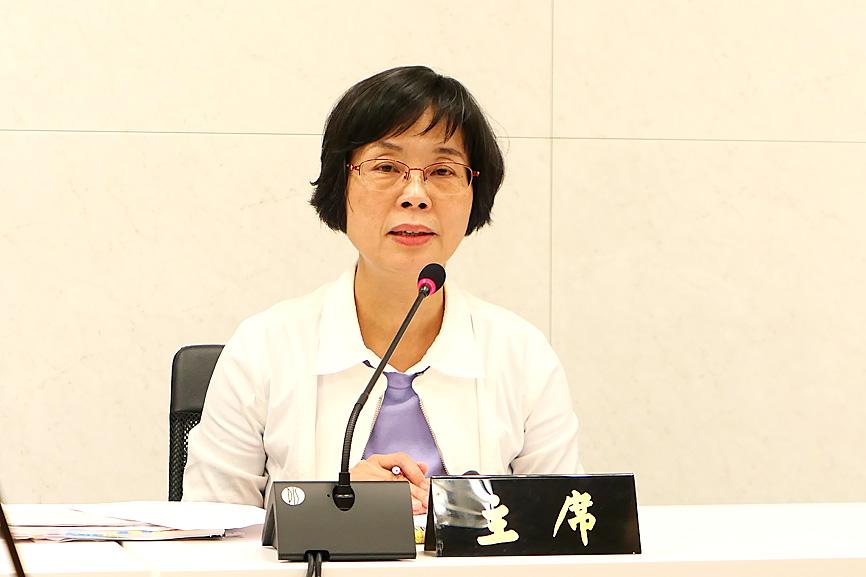Taiwan’s booming stock market contributed to a record quarter of tax revenue, figures released yesterday by the Ministry of Finance showed.
Tax revenue for last month was NT$200.9 billion (US$7.06 billion), up 19.2 percent year-on-year, with cumulative tax revenue from January to March totaling a record NT$467.2 billion, an annual increase of 16.6 percent.
While gift, inheritance, business, alcohol and tobacco, and land value incremental tax revenues all reached double-digit growth in the first quarter, the most remarkable growth was in securities transaction tax revenue, which reached a record NT$55.9 billion in the first quarter, up 102.8 percent year-on-year.

Photo: Wu Chia-jung, Taipei Times
Department of Statistics Deputy Director-General Chen Yu-feng (陳玉豐) said that Taiwan’s booming stock market has resulted in securities transaction tax revenue growing for 18 consecutive months.
“Average daily transactions on the Taiwan Stock Exchange for the first quarter totaled NT$400.7 billion,” Chen said.
Customs tariffs increased 10.3 percent year-on-year to NT$30.9 billion in the first quarter, which Chen attributed to an increase in tariffs on transportation equipment, machinery and food.
While Taiwan’s tax revenue has been increasing as a result of a flourishing economy, Chen said that first-quarter tax revenue was also bolstered by new housing projects in Taipei, New Taipei City, Hsinchu City and Kaohsiung.
“All four cities saw deed taxes grow by more than NT$100 million in the first quarter,” Chen said.
Despite the general uptrend in tax collection, Chen said that this quarter’s record haul would not necessarily guarantee bumper revenues going forward.
“There are a lot of one-time events, such as the completion of housing projects falling in this quarter, that contributed,” she said.
Besides, the first quarter is not the most important tax quarter for the Taiwanese economy, Chen said.
“With income taxes due in May and June, the second quarter is the big one to watch,” she said.

When an apartment comes up for rent in Germany’s big cities, hundreds of prospective tenants often queue down the street to view it, but the acute shortage of affordable housing is getting scant attention ahead of today’s snap general election. “Housing is one of the main problems for people, but nobody talks about it, nobody takes it seriously,” said Andreas Ibel, president of Build Europe, an association representing housing developers. Migration and the sluggish economy top the list of voters’ concerns, but analysts say housing policy fails to break through as returns on investment take time to register, making the

EARLY TALKS: Measures under consideration include convincing allies to match US curbs, further restricting exports of AI chips or GPUs, and blocking Chinese investments US President Donald Trump’s administration is sketching out tougher versions of US semiconductor curbs and pressuring key allies to escalate their restrictions on China’s chip industry, an early indication the new US president plans to expand efforts that began under former US president Joe Biden to limit Beijing’s technological prowess. Trump officials recently met with their Japanese and Dutch counterparts about restricting Tokyo Electron Ltd and ASML Holding NV engineers from maintaining semiconductor gear in China, people familiar with the matter said. The aim, which was also a priority for Biden, is to see key allies match China curbs the US

NOT TO WORRY: Some people are concerned funds might continue moving out of the country, but the central bank said financial account outflows are not unusual in Taiwan Taiwan’s outbound investments hit a new high last year due to investments made by contract chipmaker Taiwan Semiconductor Manufacturing Co (TSMC, 台積電) and other major manufacturers to boost global expansion, the central bank said on Thursday. The net increase in outbound investments last year reached a record US$21.05 billion, while the net increase in outbound investments by Taiwanese residents reached a record US$31.98 billion, central bank data showed. Chen Fei-wen (陳斐紋), deputy director of the central bank’s Department of Economic Research, said the increase was largely due to TSMC’s efforts to expand production in the US and Japan. Investments by Vanguard International

The popular Taiwan Semiconductor Manufacturing Co (TSMC, 台積電) arbitrage trade might soon see a change in dynamics that could affect the trading of the US listing versus the local one. And for anyone who wants to monetize the elevated premium, Goldman Sachs Group Inc highlights potential trades. A note from the bank’s sales desk published on Friday said that demand for TSMC’s Taipei-traded stock could rise as Taiwan’s regulator is considering an amendment to local exchange-traded funds’ (ETFs) ownership. The changes, which could come in the first half of this year, could push up the current 30 percent single-stock weight limit